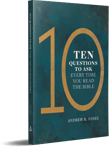One concern I hear a lot of pastors and other church workers talk about is a lack of biblical literacy or biblical fluency in their congregations. People do not seem to be as familiar with the Bible as we might hope.
When I was in my final year of seminary, one of my professors wrote an article about how the students seemed to be strong on doctrine but weak on books of the Bible. I remember reading that and thinking, “Oh, that’s me.” I was not nearly as biblically fluent as I wanted to be, so I set out on a quest to improve my own biblical fluency.
One result of this quest is my debut book, Ten Questions to Ask Every Time You Read the Bible. This book serves as a guide to help Bible readers build confidence and fluency as they read the Scriptures. It draws from my own experience of seeking to improve biblical fluency. I hope you find the book helpful. But in this post, I want to draw attention to three important facets of building biblical fluency that individuals and congregations should consider.
The Case for Curiosity
One of the attitudes toward the Scriptures that stifles biblical fluency is an attitude that treats the reading Bible as an unapproachable task. God’s people are encouraged to read the Bible, which is great. I trust that God’s Word does what God intends it to do. But far too often, God’s people think of reading the Bible as a burden. It is treated as a task, a show of piety that they are perpetually behind on, and never do enough of. When we think about reading God’s Word as a burden, that may pressure us to read the Bible more. But it does not encourage us to read the Bible more. It does not encourage us to love the Scriptures.
If we approach reading the Bible as a burden or think we have to read through these three chapters to get through our Bible-in-a year study plan, we become in danger of being mindless and numb in our reading. We become in danger of treating God’s Word as a boring chore rather than the delightful gift that it is. When we turn the reading of the Bible into a burden, we stifle biblical fluency.
If we wish to encourage God’s people toward biblical fluency, a more helpful attitude toward the Scriptures is one of curiosity. We should constantly be asking questions as we read the Bible We should ask questions of the text itself (Who are these characters? Who does God reveal Himself to be in this section?), the context (Where is this story happening? How is that culture different from my own?), and ask questions of application and retention (What strikes me as interesting in this chapter? How would I react if these events happened to me?).
Curiosity leads to discovery. As we ask questions with an attitude of curiosity, we are more engaged and more inclined to go looking for the answers. The more curious we are, the more we seek to discover, the more time we spend in God’s Word. All of this helps build biblical fluency. Furthermore, this attitude shift toward curiosity helps us view the Bible rightly—not as a burdensome task but as a gift. The Bible is God’s Word—God revealing Himself to His people.
Write Things Down
Some people do not like to write in books, especially Bibles. Other people fill their Bibles with notes and highlighter markings. Whether you choose to write in your Bible or not, writing down questions, answers, observations, and connections helps build biblical fluency. I have a journaling Bible, which has side margins on each page for taking notes. I love this Bible. It allows me to write down thoughts and questions. Then, when I read that section of Scripture again, sometimes I have found the answer in my reading of the Bible since then. The kinesthetic connection of writing things down helps us remember things. Remembering more when reading the Bible builds biblical fluency.
Read Whole Books of the Bible
Which question have you been asked more frequently:
- What’s your favorite Bible verse?
- What’s your favorite book of the Bible?
For me, it’s the first question by about a four-to-one ratio. One of the biggest challenges in our world today is that people love brief-form content. We love soundbites and highlights. We love tweets and TikToks. And we love Bible verses. We love things that are condensed and easily digested.
Even our worship services deal with shorter forms of Bible readings. We select particular verses for the week to be read. Reading an entire book of the Bible is unheard of in our worship services. (We almost get there with Philemon.)
Yet, the books of the Bible are intended to be read or listened to as, well, books. And they are not as long as you think they are. The entirety of the New Testament is only about seventeen hours in audiobook form. That’s barely more than a Lord of the Rings marathon. The longest book of the Bible, Psalms, is five hours. Most books of the Bible take under thirty minutes. Reading or listening to whole books in one sitting is doable.
When you read or listen to a whole book of the Bible, you will see connections that you simply cannot see if you only read chapter 2, verses 6–19. You will see the movement of the story, the flow of the argument, the beauty of the poetry, and wisdom cohering together.
If we wish to build biblical fluency, we must encounter the books of the Bible in their entirety rather than always segmenting them into bite-size pieces.
I hope you find these insights helpful, and I hope my book can be a helpful resource in your personal devotional life, Bible study group, and congregation as you seek to build biblical fluency and a curiosity for God and His Word.
Ten Questions to Ask Every Time You Read the Bible
 Whether you’re reading the Bible for the first time or you’ve read it cover to cover, these ten questions will help you discover truths from Scripture.
Whether you’re reading the Bible for the first time or you’ve read it cover to cover, these ten questions will help you discover truths from Scripture.














